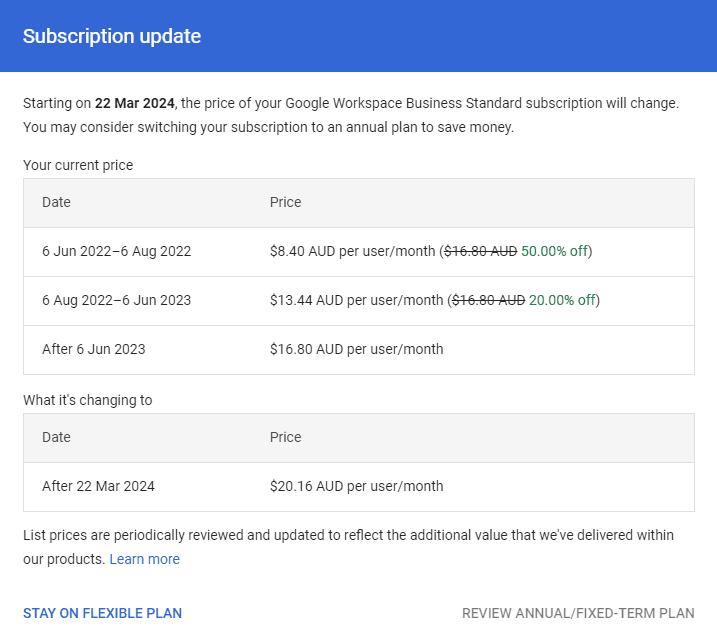In an era where digital tools are extensions of our professional and personal identities, the recent move by Google to hike the prices of Workspace services under the guise of "added value" feels, at best, arrogant, and at worst, outright disingenuous.
This action sends a clear message, echoing a broader trend of tech giants making unilateral decisions that impact millions with little regard for the real-world consequences on small businesses and individuals.
The Disingenuous Nature of Google's Communication
Google's announcement to Workspace users like me, stated: "List prices are periodically reviewed and updated to reflect the additional value that we've delivered within our products."
Can you smell the horse manure, too?
Can I just send a new invoice to my clients saying that because I've adopted the Oxford comma and have shared the writing I've done for you with my literary friends, I'm adding an extra surcharge? I think not. How dare I charge you for an "added value" when you never asked for it and, in all likelihood, have not derived any value from it?

This despicable declaration by Google is the equivalent of boarding a Qantas jet with an economy ticket, only to be informed that your seat has been rebranded to "Super Economy" because the air stewards straightened the seatbelts before boarding, warranting a near doubling of your fare.
Actually, I had better not say that too loudly because their behaviour under Alan Joyce (let me paraphrase: customers don't buy a ticket for a flight, their money just signals they we're kinda interested in the concept of flying with Qantas one day) means someone at Qantas is probably passing this idea along for a weekly revenue raising meeting!
Be that as it may, this analogy captures the essence of Google's strategy: a boast about enhancements that I've never heard about or used OR REQUESTED, presented as a significant upgrade, with the cost passed down to us users.
Only a big, bloated business can get away with something like this.
Navigating The Workspace Quandary
While it's tempting to cut ties with Google Workspace in response, the reality is that their system, much like Microsoft's, stands as one of the better integrated suites available, if, like us, you primarily just want reliable hosted email, a shared calendar, and some file space.
This leaves many small business users in a predicament, as we seek ways to minimise our financial burden without sacrificing the tools essential to our operations.
A pragmatic approach involves scrutinising our use of Google services.
For example, consider the necessity of each User account you have. Many businesses can streamline their operations by converting superfluous email accounts into aliases, funnelling messages to a primary inbox without the need for additional, costly User accounts. This not only conserves resources but also leverages the existing infrastructure in a more cost-effective manner.
For example, if you respond to our podcast, Talking About Marketing, using [email protected], that does not go to an inbox, it just goes to my account and I'll reply from there. The benefit is that the podcast address "sounds" better and more in context when promoting ways of contacting the podcast, but nobody on Planet Earth will mind one iota when the email reply comes from [email protected].
So, step one is to consolidate your User accounts if you can and step two is to consider moving from a Flexible Plan to an Annual Plan.
But DO NOT pay for an annual plan BEFORE you delete unneeded Users because otherwise you'll be paying for a whole year in advance for each one. Yes, Dr Greedy locks in those coins faster than you can Google "corporate responsibility".
Weaning Off Google: Exploring Alternatives
This juncture also presents an opportune moment to evaluate our reliance on Google's broader ecosystem.
Their search engine, once the cornerstone of the internet, faces competition from innovative services like Perplexity AI. These alternatives not only challenge the status quo with their interactive and informative search experiences but also encourage users to demand more from their digital tools.
Perplexity AI, with its ability to ask clarifying questions when you start searching, and then provide well-formed summaries along with citations, exemplifies the kind of user-centric innovation that Google's search engine has been slow to adopt.
I put the search engine, Google, and the answer engine, Perplexity AI to the test with a tough question yesterday. I searched on: "what percentage of australians have competed in state championships of mainstream sports". I didn't have high hopes of an answer without a lot of research, but let's see what I got.
Google spewed back pages of low quality, vague results ranging from links to overall participation rates across all sports down to "A Case Study Of The Skateboarding Cluster". Thanks, Google.
- Sport in Australia
- Participation in sport
- Sport 2030
- Football in Australia
- Addressing the decline in sport participation in secondary …
- A survey of cultural diversity and racism in Australian sport
- The future of Australian Sport. Megatrends shaping the …
- Participation in Sport and Physical Recreation, Australia
- 2020 - 2021 Coles LAA Annual Report
- Getting South Australia moving
- 4102.0 - Australian Social Trends, 1995
- Competition Pathways and Progressions
- Sport Inclusion Australia name Australian team for the …
- Review of Sport and Recreation in Regional …
- The Sports experiences of Lesbian, Gay, Bisexual and …
- Top 10 Sports For Boys
- SA Masters Games
- Maribyrnong Sports Academy: MSA
- Diversity and Inclusion - ACT Sport and Recreation
- Student-Athletes in my Classroom: Australian Teachers …
- Para Athletics
- Biography - Catherine (Cathy) Freeman - Indigenous Australia
- How disabled women athletes are helping mainstream …
- Australian rugby has reached its lowest point. How did it …
- Latest News
- Victorian School Sports Awards
- Engaging with Indigenous Australia—exploring the …
- Sunshine Coast Sports Hall of Fame
- (PDF) A comparison between mainstream and action sport …
- Why are Australians so good at sport?
- Mixed gender teams, democratic rules, no referees
- The Impact of Digital Platforms on News and Journalistic …
- A case study of the skateboarding cluster | Request PDF
Hmm, not much threat from the Google robots taking over!
Meanwhile, Perpexity AI asked me to clarify any particulat sports as it tried to understand the question. It offered, Soccer, Basketball, Cricket, Tennis, and Swimming, to which I added AFL, Paddling, and Kayaking.
It then looked at about 30 different sources and offered me this simple, honest, and helpful summary:
The search results provided do not contain specific information regarding the percentage of Australians who have competed in state championships of mainstream sports such as Soccer, Basketball, Cricket, Tennis, Swimming, AFL, Paddling, and Kayaking. The statistics and facts about these sports in Australia, as found in the search results, focus on general participation, league systems, and viewership rather than the specific percentage of individuals competing at the state championship level.
For example, the 2017–18 National Cricket Census showed that 1,558,821 Australians engaged in cricket competitions or programs, but it does not specify how many of those participated in state championships (3). Similarly, information about the Australian soccer league system, the National Basketball League, and other sports does not provide the exact percentage of Australians competing at the state championship level (2)(5)(6). Without specific data on the percentage of Australians competing in state championships for the mentioned sports, it is not possible to provide an accurate answer to the question based on the search results. Additional research and data collection would be required to determine this percentage.
It's like having a librarian at your disposal who knows how to use the index system and can also summarise findings for you.
Needless to say, when a search involves a topic for which there is information readily available, Perplexity AI leaves Google in its horse dust!
This divergence in service quality and user experience underscores a growing sentiment: it's time to say, "Goodnight, Google."
Charting A Path Forward
As we navigate the evolving digital landscape, the essence of our challenge lies not just in responding to price hikes and policy changes but in reevaluating our relationship with technology providers.
The goal is to foster a digital environment that prioritises transparency, user empowerment, and genuine value.
In confronting Google's latest move, we're reminded of the broader implications of our digital dependencies.
It's a call to action for users and businesses alike to advocate for fairness, explore alternatives, and engage in practices that ensure our digital tools serve us, rather than the other way around.
Giddy up and give your Google relationship a good, hard rethink.

